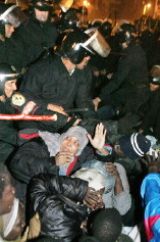Death toll rises in Egyptian raid on refugees camp
Dec 30, 2005 (CAIRO) — Egyptian police turned water cannons on Sudanese war refugees and beat them with sticks Friday, seeking to end a three-month protest at the ramshackle squatters camp in a small city park.
 At least a dozen people were killed, according to government figures, and one of the protest leaders estimated the deaths at more than double that.
At least a dozen people were killed, according to government figures, and one of the protest leaders estimated the deaths at more than double that.
Hundreds of Sudanese have been living in the park since September to protest the U.N. refugee agency’s refusal to consider them for refugee status. They want to be resettled in a third country, such as the United States or Britain, rather than go home after a peace deal ended the 21-year-long civil war in Sudan.
In Geneva, Switzerland, the United Nations High Commissioner for Refugees, Antonio Guterres, expressed his shock and sadness over the violence and deaths.
“Although we still do not have all of the details or a clear picture of what transpired, violence left several people dead and injured,” Guterres said. “There is no justification for such violence and loss of life. This is a terrible tragedy and our condolences go to all the families of those who died and to the injured.”
The Egyptian Interior Ministry said it had acted in part after the UNHCR asked for protection because it had received “threats to attack the commission offices and its members.”
The Interior ministry blamed the violence on the Sudanese and said the dead and injured were victims of a stampede.
“Attempts had been made to convince them to disperse, but to no avail,” the ministry said in a statement. “The migrants’ leaders resorted to incitement and attacks against the police.”
In a showdown played out during the first five hours of Friday, the protesters dismantled their plastic sheeting and cardboard, but most refused to leave on buses brought in to take them to camps elsewhere in Cairo.
Shortly before dawn, thousands of riot police encircled the camp, set up near the refugee agency to draw attention to the refugees’ demands. Police fired water cannons at the protesters, then invaded the park when the Sudanese refused to leave.
Protesters could be seen fighting back with long sticks that appeared to be supports for makeshift tents.
Police beat the unarmed migrants with batons, continuing to hit them even as they were being dragged to the buses. One officer carried a girl of about 3 or 4 years old who was unconscious. An ambulance worker said the girl was dead.
A policeman clubbed a Sudanese man with a tree branch as two officers hauled the refugee away.
An official Interior Ministry statement said 12 protesters died and 74 police were wounded, but other ministry officials, speaking on condition of anonymity because they were not authorized to speak to the press, put the number of dead at 20.
Boutrous Deng, one of the protest leaders, told The Associated Press that 26 Sudanese were killed. He said the dead included 17 men, two women and seven children.
Officials at the South Center, an independent Sudanese human rights group, said 1,280 refugees were taken by bus to three locations outside Cairo. In a statement faxed to AP in Cairo, the group described the police assault as “savage.”
The refugee agency said last week that it had reached a deal with some of the protest leaders, promising to resume hearing some migrants’ cases and offering a one-time payment of up to $700 for housing in Egypt. But most of the migrants rejected the deal, saying they wanted promises of resettlement abroad.
“It is extremely sad that people had to die,” said Astrid Van Genderen Stort, a spokeswoman for the UNHCR in Cairo.
The agency stopped hearing the cases of Sudanese seeking refugee status after a January peace deal ended the war in their home country.
At times the Sudanese numbered up to 2,000 in the camp, about the size of four tennis courts. At least three refugees have died in the camp, including a 4-year-old boy who succumbed to pneumonia earlier this month.
About 30,000 Sudanese are registered as refugees in Egypt, and estimates of Sudanese living in the country have ranged from 200,000 to several million.
But Egypt, which suffers from high unemployment and strained social services for its own population of 72 million, offers the Sudanese little assistance, and the Sudanese complain of discrimination by Egyptians.
(AP/ST)
